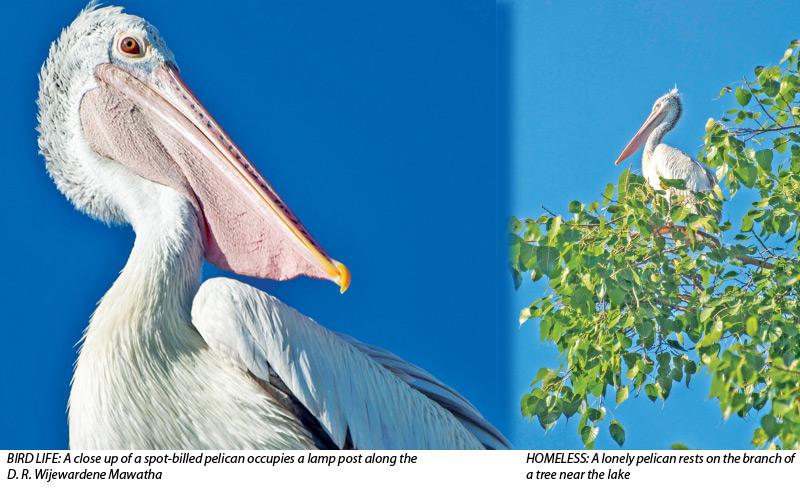
Beira Lake is no stranger to people who come to Colombo daily. Located in the heart of the city, the lake nestled in a part of the metropolis receives a variety of birds such as cormorants, egrets, herons, painted storks and ubiquitous bigger spot-billed pelicans. Even though the water body lies amid the hustle and bustle of the city, the view across the lake surrounded by high-rise buildings and birds is breathtaking.
This time what led me to Beira Lake was not just landscape photography. I primarily wanted to click pelicans’ life in the early morning hours.
Beira Lake is part and parcel of our life. The gentle breeze that blows across the lake touches us on the upper floor of our office at Lake House or Beira Gedara. It gives a picturesque setting to our office.
Every day, I follow the short-cut from Pettah to my office which leads through the edge of Beira Lake. It has always fascinated me because of these avian visitors. A section of the Lake lies between the Fort Railway Station and the Lake House edifice which is a boundary that connects Fort to the Pettah.
Every morning when I cross this section, a magnificent sight is visible in the lake where a flock of spot-billed pelicans hurriedly paddle in the waters searching for their first prey of the day. It is a mesmerizing scene for pedestrians. Indeed, it may also be one of the most striking moments for bird photographers who look for birds’ actions in the early morning.
All of a sudden, a flap of a wing, a gentle glide across the sky, and a moment of contemplation before it perches first on one tree, then another – I follow a spot-billed pelican until it merges into a sea of flapping wings. As I look around, I find all tree tops and nearby lamp-posts painted in hues of white. The pelicans have landed and I am in no bird sanctuary but near the Beira Lake in the Colombo city.
A flock of pelicans comes in, the birds announcing their presence loudly, whistling as they frolic and splash in the water before settling down. They float by quietly. I look at them through the camera as they curl up in the waters. They strike several poses creating a stark contrast on the greenish water.
Throughout the year, flocks of spot-billed pelicans can be spotted in large tanks around the country seeking a safe haven.
Pelicans have no permanent home and are the great wanderers of Mother Nature. Even amid the concrete jungles of Colombo, pelicans make themselves at home in the Beira Lake which attracts these birds as they love inland water. While struck in traffic, one is sure to come across a pelican perched on a lamp post along D.R.Wijewardene Mawatha and Sir Chittampalam Gardiner Mawatha just after 7 in the morning.
As the sun gets harsher at noon, one can spot them flying in large circles high over the skies of Colombo. If they were bigger or heavier, they would not have been able to fly, just like flightless birds such as the ostrich.

These avian guests are seen in large numbers near water bodies. It is after all the saline water wetlands and marshlands, coastal areas with dunes and beaches that make Sri Lanka a hot spot for migratory birds. The good thing is that you don’t have to go to the remote wilderness to spot a bird. They could be easily sighted in urban water bodies such as the Beira in the heart of Colombo.
This is due to the soil and waters that offer these avians a good meal. The soft soil and shallow depths make it easy for birds to ‘dig’ for prey.
Spot-billed Pelicans (Pelecanus philippensis), mostly eat fish. They are distinguished by their elastic throat pouches used as a dip-net. The pouch is not used to store the fish, which are swallowed immediately. It swims in formation, driving small schools of fish into shallow water where they are scooped up by the birds.
The spot-billed pelicans, despite being found in many countries in Asia, breed only in Sri Lanka, Cambodia and certain parts of India.
With so much to offer, Beira Lake can be an ideal tourist spot. The government has launched new projects to develop the lake as a tourist destination. The walking paths covering some part of the bank of the lake have been constructed and a luxury boat service is available for tourists and commuters.
Bird-call echoes through the air as the people go about their daily work. I stand at the edge of the lake for a long time, watching the pelicans in their habitat, safe from poachers. Wheeling in over large circles they descend slowly and make a gentle landing in the lake with a splash and a ripple. A streak of white blinds me as a flock flies out. I follow them to the road where we part ways.
